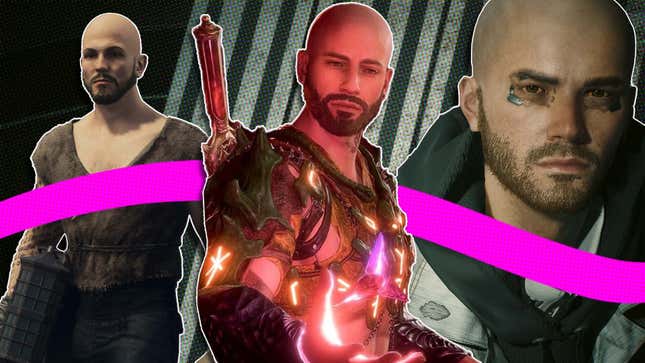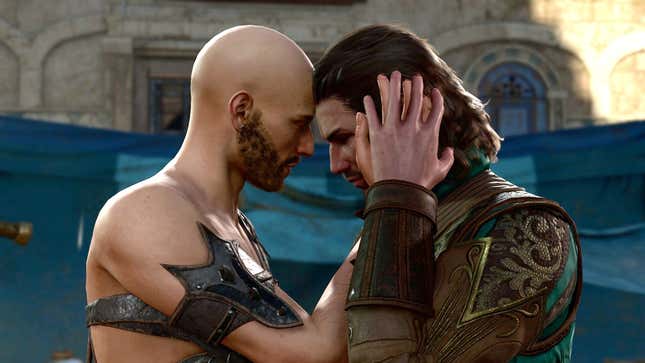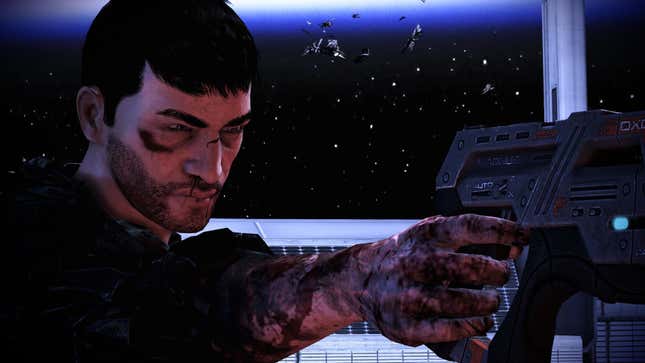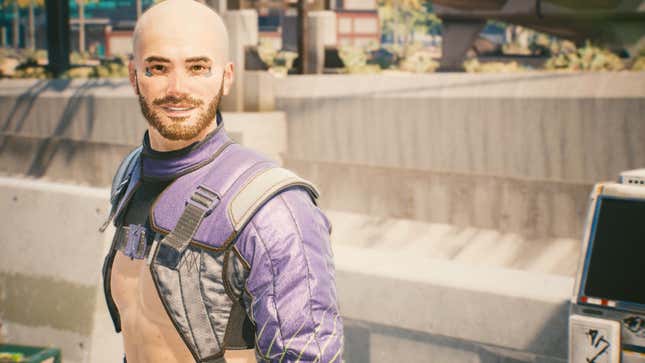
On the day I started here at Kotaku back in 2022, the very first post I wrote had an image of a character who looked like me right at the top. It was my custom V from Cyberpunk 2077, and he’s appeared more than a few times on this site as I’ve covered the game and its Phantom Liberty expansion. But he’s not the only character who looks like me who has graced the Kotaku homepage in the past year-and-a-half. My Baldur’s Gate 3 warlock, Street Fighter 6 avatar, and Dragon’s Dogma 2 Arisen have all made appearances on Kotaku since I got here. Hell, my Pokémon characters look like younger versions of me. If you’ve been annoyed seeing a lot of bald, bearded, gay men on Kotaku’s front page, don’t worry; every editor I’ve worked with here has asked me at least once not to use my avatars on every article I post and my friends even give me shit for it.
But why do all my characters look like me? If a game like Baldur’s Gate 3 is going to give me so many options to create characters of different species, classes, and backgrounds, why do I always default to playing myself? Am I not denying myself the wealth of possibilities these developers have created by only experiencing a game through my own eyes? Well, for me, diverging paths and choices are things I like to learn about after playing a game for the first time. Games have become a space for me to explore my own identity, values, and decisions first and foremost. Everything else is just extra.

It’s worth noting that being able to do this is easy for me. As a white dude with no hair and a beard, you’d be hard-pressed to find a game that didn’t have the options I need to make a digital facsimile of myself, while I know plenty of people of color who have run into issues with character creators not matching their skin tones or hair textures. Really, the biggest hurdle I have in making myself in most games is that not every game lets me be the 5’3” short king I am (shoutout to Capcom for letting me be a little guy in Street Fighter 6 and Dragon’s Dogma 2, though), but I make it work. Even in games like Sonic Forces that don’t let me make a human, I give my fursona some defining piece of clothing that makes it clear that’s me in that universe. As for why I do this, as my therapist says about everything I do: making myself in every game is probably a trauma response, actually.
One of the most formative internet spaces for me in my teenage years was the now-dead BioWare Forums. I was on these forums almost daily in 2009 and 2010 when Mass Effect 2 was coming out. The original game was my all-time favorite and had a hand in helping me sort out my own identity as a gay man. So naturally, as the sequel approached, I was scouring the forums for word on whether or not protagonist Commander Shepard would be able to enter a gay relationship this time around. This didn’t come to fruition until Mass Effect 3, but I had to watch some of the vilest homophobic discourse unfold, where queer fans had to argue with the most stubborn of bigots attempting to intellectualize, specifically excluding gay men.

I still remember so many internet randos making broad, sweeping declarations about the singular character of Commander Shepard. This was a protagonist onto whom I’d gone out of my way to project all my values and personality, and yet homophobic assholes were grasping at any in-game interaction they could as “proof” that every version of the first human Spectre was a heterosexual. Not that BioWare helped during the worst of those online battles.
Mass Effect’s long battle to inclusive relationships was hampered for years by BioWare’s own insistence that its hero was a “pre-defined” heterosexual, despite otherwise being entirely made up of choices made by the player. The insistence that my Shepard wasn’t gay like me made those games fraught for me, to the point where I was so deliberate with the decisions I made that it felt like I was actively rebelling against the notion.
Eventually, Mass Effect 3 came along, and after projecting an unrequited love story on the two for two games, I got to make my Shepard enter a relationship with Major Kaidan Alenko. This experience, of being told who my characters were and could be, made me determined to never again leave room for doubt. Things have gotten marginally better since Mass Effect, but gay men are still never the default in AAA games and are only a choice, often given less love. It seems being told for so long that these stories weren’t about me or people like me has rewired how I play games.

Games, for me, have become a tool for self-exploration as opposed to world exploration. It’s almost like I treat games like I’ve been Isekai’d into a new world, ones I navigate as if I have been personally faced with the same choices and challenges of my digital facsimiles, adjusting ever so slightly to account for the story that’s being told.
My version of V from Cyberpunk 2077 lived in the metropolis Night City his entire life, but he still holds my hope for a better, less dystopian future in the company of the ones he cherishes. My Renegade Shepard is my teen angst personified, so by the time I reached Mass Effect: Andromeda, my Pathfinder Ryder could embody my hope for the future. My Tav in Baldur’s Gate 3 holds my self-destructive, hopeless romantic tendencies as he navigates his relationship with his patron and his lover, Gale. My Pokémon trainer? I don’t know, he likes the electric rat a lot, and wears a red beanie most days.
For me, making a hero in a video game is not about creating an original character and immersing myself in another identity. I’m leaving time capsules of who I was, who I am, and who I hope to become. The characters I’ve left behind have each captured a moment in my life when I was angry, hopeful, or, in some cases, before 2018, when I had hair on my head instead of just my face. But through their stories, I’ve mapped out my own. If I’m going to live out these stories, they’re going to be mine.